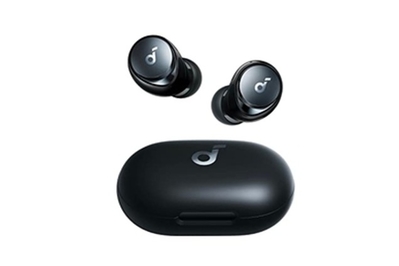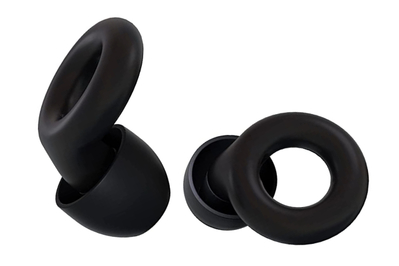Ask Wirecutter: Help! I Can’t Stand My Spouse’s Lip Smacking and Loud Chewing.

Annemarie Conte is an editor who writes the Ask Wirecutter column and trending-product reviews. She’d love to make you a friendship bracelet.
Welcome to Ask Wirecutter, where deputy editor Annemarie Conte helps you figure out how to make the most of your stuff in real life. If you have a shopping conundrum for our advice columnist, submit it using this form.
Dear Wirecutter,
My spouse is the loudest chewer. There’s lip smacking and all sorts of mouth noises that drive me crazy. What can I do to help block out these annoying noises?
M.P.
Dear M.P.,
If you’ve been with someone long enough, something about them—often many things about them—will surely start to annoy you. And there’s basically two ways this can go.
- This thing about you drives me nuts, and you absolutely need to change it.
- This thing about you drives me nuts, and I’ve learned to live with it.
Your partner’s noisy indications that their meal is delicious are considered by some to be bad table manners. Could it be possible that they don’t realize what they’re doing? You might start by gently and kindly telling them, and make it clear you’re coming from a place of love and not criticism.
But if they already know—and if it’s settled that their clamorous chewing is here to stay—you may want to consider solutions to help quiet the noise for yourself.
If this is a problem you encounter more generally throughout life, it may be worth talking with your doctor. Noise sensitivity could be a symptom of misophonia, a disorder in which common noises cause intense emotional and physiological responses, or hyperacusis, a rare hearing disorder where sounds that others find normal feel excruciatingly loud to you.
We’re not here to dispense medical advice, so it’s always best to see a health provider if you suspect you are affected by either.
But we can offer advice to help combat noise sensitivity. Senior staff writer and audio expert Lauren Dragan has done extensive reporting on this issue.
Here’s Lauren:
Advertisement
SKIP ADVERTISEMENTMask the noise
Our pick
These tiny earbuds have great sound, excellent noise cancellation, a long battery life, and a helpful hear-through mode. But the touch controls are slightly limited.
Buying Options
With clipped on-page coupon
Consider using earbuds or headphones that have hear-through capability but can dampen some noise while you engage with your partner during mealtime.
With the press of a button, our top-pick Bluetooth earbuds, the Soundcore Space A40, let in outside sounds so you can engage in conversation but still bury the offending noise under a more pleasant sound.
All you need to do is find a sound you like that is in a similar frequency range. For example, if the noise that specifically annoys you is high-pitched, you may want to seek out sounds with higher frequencies in the foreground, like rain on a street, white noise, or a waterfall.
It may seem involved, but if you really want to mask noise, you may benefit from listening to a soundscape as well. In our guide to meditation apps we recommend Headspace and Calm, which have fantastic libraries of endlessly looping audio. For shorter durations, you can also find tracks on Spotify or Apple Music that do the trick.
Of course, you can turn off the hear-through feature whenever you feel the need to isolate yourself completely. I think of this as my ears’ version of me time.
Reduce the volume
Our pick
Although no universal concert earplug can reduce different sounds as evenly as a custom design, this pair offers solid noise protection and is the most enjoyable to wear.
Buying Options
These are similar to the Loop Experience Earplugs, but they’re designed specifically for people with audio sensitivities.
Buying Options
Traditional drugstore foam earplugs are effective at blocking out noise, but they really put a damper on potential dinner conversations.
Earplugs made for concerts, however, still allow you to hear your surroundings—just at a lower volume.
I love the Loop Experience Earplugs because they’re comfortable, discreet, and look like jewelry—far superior to the neon-orange, Frankenstein-bolt look of foam earplugs. They offer an 18-decibel single number rating (SNR, a system that rates hearing protection), which is enough for most clubs and concerts.
However, if you want a pair that functions better in quieter environments—like the dinner table—the Loop Engage Earplugs have a 16 dB SNR and are designed with audio-sensitive folks in mind.
I’ve used both and find the Experience earplugs are fantastic for kids parties, while the Engage earplugs are ideal for working at home while maintaining an ear on kids/dogs/doorbells.
Advertisement
SKIP ADVERTISEMENTRedirect the soundwaves
You can also try the Calmer system by Flare Audio, which doesn’t block sound like an earplug but can make sounds more pleasant.
The Calmer silicone buds are not earplugs, and they don’t protect your hearing from loud noises. Instead, they’re like little squishy funnels that nestle in your ear canal and, according to Flare, “redirect sound” into your ears. You can hear your surroundings completely, but devotees tell me the high frequencies feel less piercing or jagged.
Some people say they get less distracted or annoyed by sounds while wearing a pair. Though I have yet to encounter any independent scientific study that corroborates these claims, enough people, including those with audio processing disorders, have told me they found relief that I feel it’s worth mentioning. At the very least, the sets are inexpensive at about $30, which is certainly a small price to pay for dinnertime relief.
Hello, it’s Annemarie again. Thanks, Lauren!
Lauren sent me a pair of Calmer buds, and I have to say that I’m impressed. I get aggravated by repetitive noises like a ticking clock or a co-worker’s jangly bracelets, so I spent several days with the pair. The Calmer packaging promised less stress around busy places, eating and chewing, traffic, ticking and tapping, electric buzzing, and children, which really spoke to me.
This by no means encapsulates a full Wirecutter test, but in my experience, the lightweight buds really do work. Wearing them helped me focus on my job while a construction vehicle was repeatedly backing up outside my office, and it helped reduce my anxiety during a raucous Girl Scout Cookie booth sale (groups of children terrify me).
The one drawback for me was that I initially shoved a bud in my ear backwards and too far, requiring my husband to remove it with a pair of tweezers. Make sure you follow the visual and written instructions in the packaging before jamming these things into your earholes.
The takeaway
Although a spouse’s loud chewing may sound like a fringe issue, Lauren and I really feel for you. It’s hard to be confronted with something that upsets or annoys you on a regular basis. I hope that these tips—and a medical professional, if necessary—help you get the relief you need, so that you and your partner can fully enjoy your meals.
This article was edited by Jason Chen and Adrienne Maxwell.
Meet your guide
Annemarie Conte is a deputy editor at Wirecutter. She has written and edited for multiple local and national magazines throughout her career. You can follow her on Instagram.
Advertisement
SKIP ADVERTISEMENT



